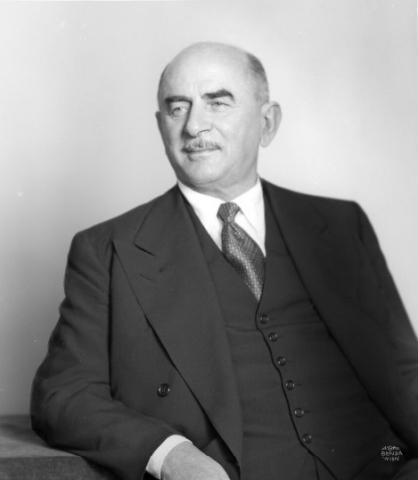Bernhard Altmann came from an orthodox Jewish family in Galicia. His maternal grandparents had a knitwear factory in Przemyśl, where he was born, managed by his mother Keile (later Karoline) Tischler before she married. After a company founded by Bernhard s father Chaskel (later Karl) Altmann went bankrupt, the family moved at the turn of the century to Vienna. Bernhard Altmann worked initially as Prokurist (authorized signatory) in the knitwear factory founded by his mother in the 5th district but in 1915 established his own company, at first trading on commission in wool but quickly expanding to the manufacture of woollen goods. Shortly after the First World War, he installed a knitwear factory in the 5th district. Branch offices and sales outlets were set up in Bregenz, Zurich, London, Berlin and Milan. In 1932, Altmann founded a hosiery factory in Paris. A knitwear factory set up in 1926 in Kosino near Moscow was seized by the Soviet government in the early 1930s.
Bernhard Altmann fled shortly after the annexation in 1938 from Vienna to Paris, emigrating the same year to Britain, where he established a factory in Liverpool. His youngest brother Fritz was deported to Dachau in April 1938 and held as a hostage by the Gestapo after his release on the site of Altmann's factory. The aim was to get hold of Bernhard Altmann's foreign holdings. He managed to organize the flight of his wife Nelly, his long-standing lover and later second wife Wilhelmine North, and his brother Fritz and his wife Maria Altmann (née Bloch, from 1917 Bloch-Bauer). Bernhard Altmann's factory was taken over by three Aryanizers, Kurt Bagusat, Alfred Böhme and Erich Schwarz. Schwarz, the only one with a knowledge of this industrial sector and also the only Austrian was in fact merely a front man and soon left the company. In negotiations in Paris and London in 1938, Bernhard Altmann agreed to the transfer of the factory without compensation. The contractually agreed payments of £ 400 a month for five years for consultancy and export promotion soon dried up. After a fierce power struggle and the departure of Böhme as a result, Bagusat became the sole proprietor of the company, now called Wiener Wollwaren-Werke Kurt Bagusat. The Hohenfels villa in the 13th district, which Altmann had lived in with his wife Nelly, was expropriated along with all interior furnishings and a valuable art collection including several works by Albin Egger-Lienz and Gustav Klimt. Between 17 and 22 June 1938 of the villa furnishing and much of the collection were auctioned on the spot by the Dorotheum. The 1,390 lot numbers included pictures, period and everyday furniture, silver, jewellery, porcelain and glass objects, East Asian objects and Persian carpets.
When the Second World War began, Bernhard Altmann was deemed an enemy alien and had to liquidate his factory in Liverpool. He emigrated in 1940 to the USA , where he established a manufacturing facility in San Antonio, Texas, specializing in Kashmir products, and became a leading international textile manufacturer. From 1946, together with the two public administrators and the remaining specialist employees, he started rebuilding the Vienna company, which was not restituted until 1948. Altmann, who lived in New York City, did not return permanently to Austria, however. His efforts to regain his valuable art collection were only partially successful. In the 1950s, six of his nine Egger-Lienz pictures were returned, including items from the Kärntner Landesgalerie. The painting Ave Maria after the Battle of Bergisel, which was in the Zentraldepot für beschlagnahmte Sammlungen (Central Depot for Seized Collections) and had been transferred in 1940 to the Ferdinandeum in Innsbruck, had already been restituted in 1950. In 2002 the city of Lienz returned the picture Schnitger to Altmann's heirs. In 2003, the Art Restitution Advisory Board recommended the restitution of a publication from the Austrian National Library and the oil painting Portrait of a Lady by Gustav Klimt from the Österreichische Galerie Belvedere.

